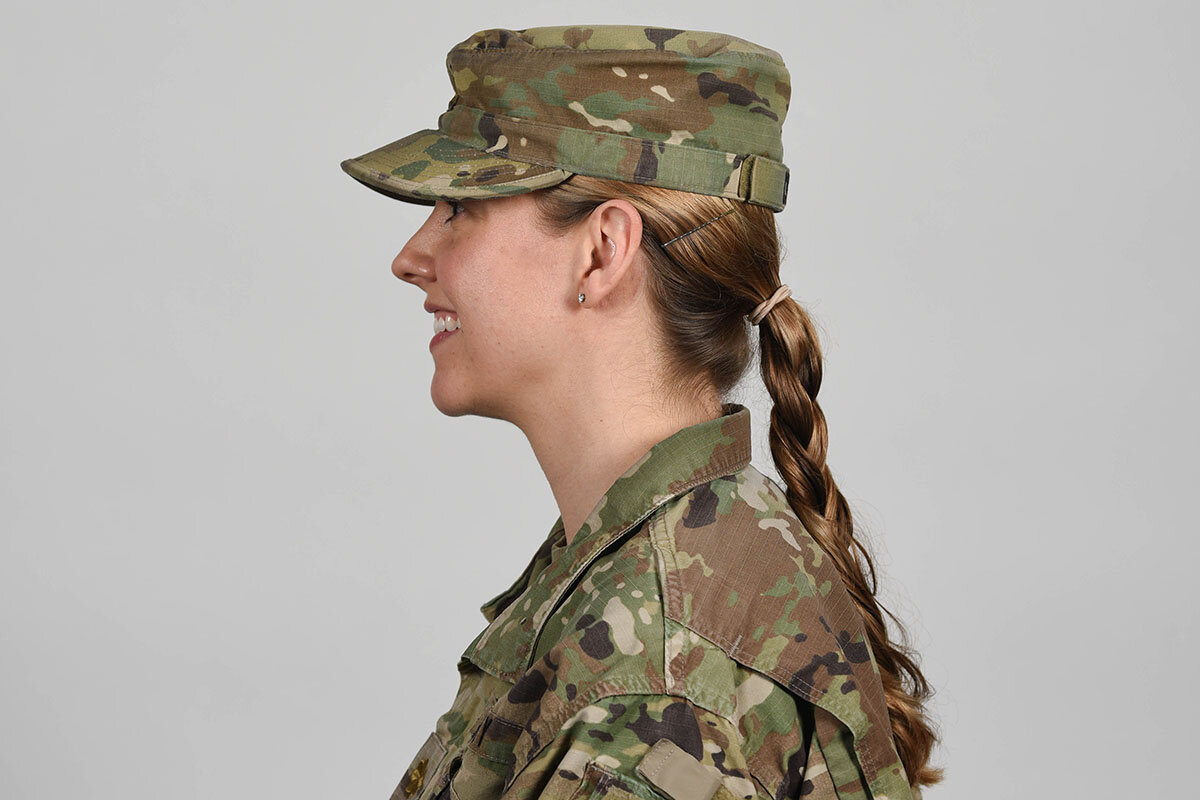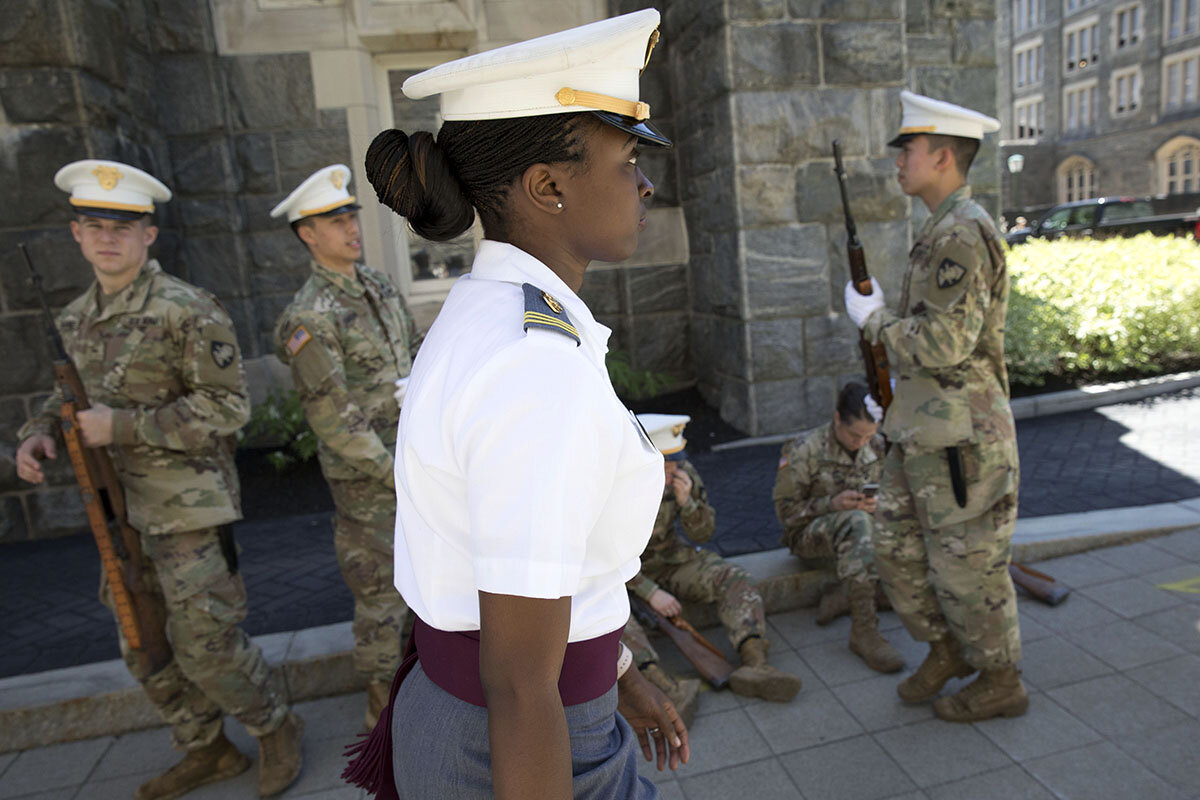Ponytails and braids: Signs of a more inclusive US military
Loading...
On a Pentagon stage earlier this year, three senior noncommissioned officers โ all men โ discussed the merits of changing the Armyโs appearance regulations for women.ย
The town hall, broadcast online, turned to whether women should be allowed to wear stud earrings. โIโm just going to be honest: If youโd asked me before, I wouldโve said, โNo, why do we need earrings?โโ said Sgt. Maj. of the Army Michael Grinston.ย
But task force testimony from behavioral health specialists helped the men see the matter differently, Sgt. Maj. Mark Clark added. โI will tell you, we learned quite a bitโ about how old policies affected women โin a masculine Army.โ Earrings โkind of helped bridge the gapโ for those โwho want to serve and be soldiers, but also want to feel like a female at the same time.โย
Why We Wrote This
What may seem like a superficial change in grooming standards signals a sea change in attitudes about military strength.
It was a town hall convened to announce sweeping changes to what are known as Army grooming standards, including allowing women to wear ponytails and braids rather than buns alone, and eliminating from policy guidance words like โeccentricโ and โfaddish,โ which โseem to target a specific demographicโ of women of color, an Army PowerPoint slide noted.
โThis really goes back to a larger thing โ diversity and inclusion,โ Sergeant Major of the Army Grinston told the town hall. โAre these microaggressions, those things that we were saying that maybe we didnโt know were offensive? Maybe we need to be aware of that.โ
โRoger that,โ said Sgt. Maj. Brian Sanders, the third man on the panel, who cautioned that the military must guard against โweaponized wordingโ as well as โclarify what do we mean by โprofessionalโ appearance โ that is such a subjective term.โย
It was an extraordinary exchange among senior noncommissioned officers, who concluded that maybe itโs all right for women to be feminine โ or unfeminine, or โeccentricโ โ in a masculine environment.
And while the revamping of Pentagon regulations related to hair, nails, and jewelry is the first such major change in many years, the larger cultural shift within the U.S. military, analysts say, is how this is expanding ideas about what a soldier should look like in the first place.ย
โHair can be seen as a cosmetic thing, but itโs also a way to recognize that service members come from different genders, different identities,โ says Maj. Kelly Atkinson, assistant professor of political science at the U.S. Air Force Academy. โUsually thereโs this assumption that masculinity is strength and femininity is weakness. My answer is that the military doesnโt have to be masculine to be successful.โย
Reactions beyond the military
That remains a threatening idea in many camps. Fox News host Tucker Carlson notoriously attacked new maternity uniforms in a March broadcast, deriding them for making a โmockery of the U.S. military.โย
Such notions have been in place since women have been in uniform. In addition to their other duties, they have been expected to walk a fine line between being too feminine โ thus raising questions about whether they joined the service to steal some husbands โ and being too masculine, risking accusations that theyโre just trying to be men, with all the shame those propositions are meant to imply.
What made this decadeslong critique raised by Mr. Carlson different is the way military men quickly joined women in the ranks to set the record straight.ย
Perhaps Mr. Carlson feels he has โsomething to prove,โ Pentagon press secretary John Kirby, a retired rear admiral, speculated in comments some interpreted as subtly alluding to Mr. Carlsonโs lack of military service. In any case, commanders would not be taking โpersonnel advice from a talk show host,โ he added. The Pentagonโs internal press service , โPress Secretary Smites Host That Dissed Diversity in U.S. Military.โย
Mr. Carlson wasn't the only critic, as Maj. Alea Nadeem, an intelligence officer in the Air Force Reserve, can attest.ย โWe also got some comments like, โOh, youโre just trying to look cute,โโ she says. โI can assure you thatโs not the case.โ
The benefits of braids over buns
Indeed, the changes, officials discovered, are eminently practical and potentially lifesaving. When Major Nadeem was out on the firing range years ago, for example, she wore her long, thick hair in a regulation bun. The problem was that the bun was tipping her helmet forward, making shooting accurately a problem.
She asked instructors if she could undo her hair and tuck it into her collar. โThey were like, โSure, whatever you need to do to shoot.โโ Afterward, she recalls thinking about what would happen if she was really at war.ย
Now, as Womenโs Initiative team chief for the Air Forceโs Barrier Analysis Working Group, Major Nadeem leads the task force that lifted the ban on a number of hairstyles in January, allowing women to wear ponytails and braids, just weeks before the Army followed suit with its own historic changes.ย These changes, which also includeย scrapping minimum hair lengthย requirements for women,ย officially went into effect for soldiers earlier this month.ย
โBefore when they wore their helmets to fly, our female aviators had to take their hair down from a bun and put it in two braids so the helmet would fit. So in order to fly their aircraft, they had to be out of standard,โ notes Major Nadeem.ย
Then there were the gas masks. โThe first thing they tell you when youโre female is โTake your hair down, because thereโs no way youโre going to get a good seal with that bun.โโย
In further acknowledgment that the lack of hairstyling options was unhealthy, military officials brought in dermatology consultants and found that one-third of Black female troops were experiencing hair loss, and more than half of women ended their days with tension headaches.
Still, some of the strongest voices against change were servicewomen themselves. โA senior female officer said, โHey, I had headaches too, but I made the choice to cut my hair because I love my country,โโ Major Nadeem recalls. โI said, โWouldnโt it be nice if you could serve your country and have your hair?โโ
Today, commanders are gradually coming around to such dualities. โI think thatโs what I really learned this last year,โ Sergeant Major of the Army Grinston told the town hall. โAnd I was at fault in this: I used to say, โWeโre all soldiers; I just see green.โโ That said, he explained, โnot only are you a soldier, but there are other pieces of you that are critical.โ
โItโs OK to stand out,โ he added. โIf people judge you for that, they need to be corrected โ not you.โ







